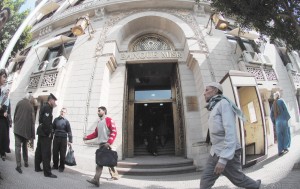
(DNE Photo)
Minister of Investment Ashraf Salman estimated that his ministry’s debts to National Bank of Egypt (NBE) and Banque Misr are worth EGP1.6bn following an untapped lands swap plan involving holding companies affiliated with the ministry in order to decrease those companies indebtedness to banks.
Salman said that “we did not settle on whether we will pay those [remaining] dues in cash or through obtaining land, but it will probably be in cash.” The move is aimed at providing liquidity to nine holding companies that represent the government’s hand in providing services and basic commodities in order to end a long history of those companies’ indebtedness to banks.
“We will soon hold a meeting with NBE and Banque Misr to pay dues estimated at EGP 1.6bn, which represents a historic repayment of these companies’ debts worth EGP 32bn through the banks acquiring untapped lands,” the minister said.
Ahmed Shawky, general manager and head of the Insolvent Debt Sector at the Arab African International Bank (AAIB), said that the pressures experienced by the public sector companies and accumulating losses, were inherited from prior leadership. This, along with debts to the banking sector, contributed to banks’ reluctance to pump new investments in the companies in recent times.
Shawky added that Salman’s decision to begin the restructuring process will serve as a new stimulus for the banks to develop strategies to grant credit facilities once more, especially since most banks have plans for credit sector expansion in light of improved economic conditions and the gradual return of cash flows.
He emphasised that the comprehensive restructuring announced by the Ministry of Investment, will not take place without studying all credit cases and determining feasibility and expected losses.
The debts of holding companies affiliated with the ministry before the resettlement operations by former minister Mahmoud Mohieldin took place amounted to EGP 32bn.
The banks received different land plots of various sizes and in diverse locations belonging to the Cotton and Textile Industries Holding Company, Chemical Industries Holding Company, Food Industries Holding Company, National Company for Construction and Development, and Holding Company for Maritime and Land Transport, after their having been relieved of the debts that they were unable to repay.
A banking source who contributed to the asset swap said that there were no obstacles to financing the public sector and its businesses, because its own assets allow for a credit and borrowing capacity of up to $40bn.
“The total value of the public business sector is EGP 80bn. The state did not take an interest in the sector over the past four years, and we are working on reviving the public sector once more because it makes significant contributions to GDP,” according to Salman.




